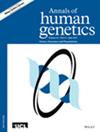Colorectal cancer is the second leading cause of cancer-related deaths in women and men in Algeria. Lynch syndrome (LS) is an autosomal dominant disease caused by heterozygous germline pathogenic variants in mismatch repair genes (MMR) and frequently predisposes to colorectal cancer. However, data about MMR germline pathogenic variants in Algerian patients are limited. This first nationwide study aims to describe clinicopathologic features and germline variants in MMR genes in Algerian families with suspected LS. Sixty-four (64) families with suspected LS were studied. Index cases with LS who fulfilled Amsterdam criteria were screened by PCR-direct sequencing for germline variants in MMR genes: MLH1 (exons 1, 9, 10, 13, 16), MSH2 (exons 5, 6, 7, 12), MSH6 (exons 4 and 8) and PMS2 (exons 6 and 10). We selected these specific risk exons genes since they have a higher probability of harboring pathogenic variants. In addition, two unrelated LS patients were screened by next-generation sequencing using a cancer panel of 30 hereditary cancer genes. Six germline pathogenic variants and one germline likely pathogenic variant were identified in 19 (29.68%) families (4 MLH1, 2 MSH2 and 1 MSH6). Of index cases and relatives who underwent genetic testing (n = 76), 30 (39.47%) had MMR pathogenic gene variants, one (0.13%) had MMR gene likely pathogenic variant and three had MMR variant of uncertain significance, respectively. Two novel germline pathogenic variants in MLH1 (2) and one germline likely pathogenic variant in MSH6 (1) never published in individuals with LS have been detected in the present study. The recurrent MLH1 germline pathogenic variant c.1546C>T has been found in nine LS families, six of them related with two large kindreds, from four North central provinces of Algeria. In addition, the common MSH2 germline pathogenic variant c.942+3A>T has been detected in five unrelated patients with a strong LS family history. The accumulative knowledge about clinicopathological and genetic characteristics of LS in Algerian patients will impact clinical management in the areas of both prevention and treatment.


